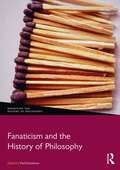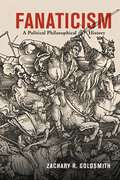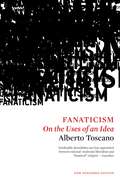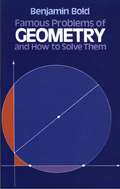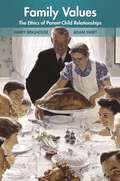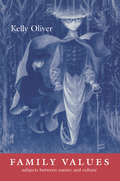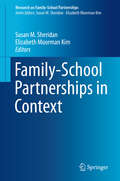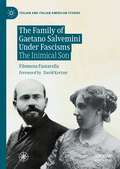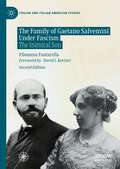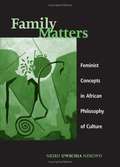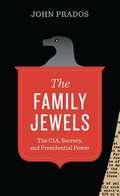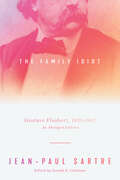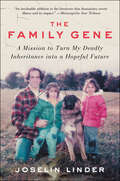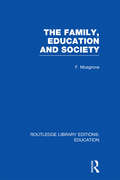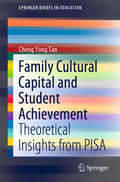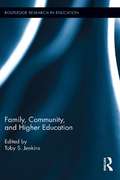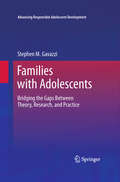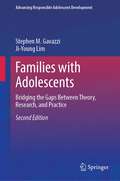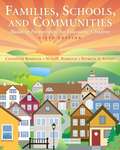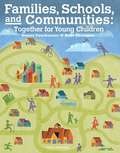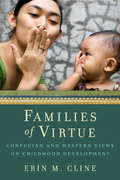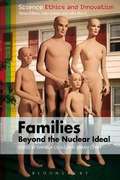- Table View
- List View
Fanaticism and the History of Philosophy (Rewriting the History of Philosophy)
by Paul KatsafanasVoltaire called fanaticism the "monster that pretends to be the child of religion". Philosophers, politicians, and cultural critics have decried fanaticism and attempted to define the distinctive qualities of the fanatic, whom Winston Churchill described as "someone who can’t change his mind and won’t change the subject". Yet despite fanaticism’s role in the long history of social discord, human conflict, and political violence, it remains a relatively neglected topic in the history of philosophy. In this outstanding inquiry into the philosophical history of fanaticism, a team of international contributors examine the topic from antiquity to the present day. Organized into four sections, topics covered include: Fanaticism in ancient Greek, Indian, and Chinese philosophy; Fanaticism and superstition from Hobbes to Hume, including chapters on Locke and Montesquieu, Shaftesbury, and Hutcheson; Kant, Germaine de Stael, Hegel, Nietzsche, William James, and Jorge Portilla on fanaticism; Fanaticism and terrorism; and extremism and gender, including the philosophy and morality of the "manosphere"; Closed-mindedness and political and epistemological fanaticism. Spanning themes from superstition, enthusiasm, and misanthropy to the emotions, purity, and the need for certainty, Fanaticism and the History of Philosophy is a landmark volume for anyone researching and teaching the history of philosophy, particularly ethics and moral philosophy. It is also a valuable resource for those studying fanaticism in related fields such as religion, the history of political thought, sociology, and the history of ideas.
Fanaticism: A Political Philosophical History
by Zachary R. GoldsmithAs the post-WWII liberal democratic consensus comes under increasing assault around the globe, Zachary R. Goldsmith investigates a timely topic: the reemergence of fanaticism. His book demonstrates how the concept of fanaticism, so often flippantly invoked with little forethought, actually has a long history stretching back to ancient times. Tracing this history through the Reformation and the Enlightenment to our present moment of political extremism run amok, Goldsmith offers a novel account of fanaticism, detailing its transformation from a primarily religious to a political concept around the time of the French Revolution. He draws on the work of Immanuel Kant, Edmund Burke, and Fyodor Dostoevsky—all keen observers of fanaticism, and especially its political variant—in order to explore this crucial moment in the development of political fanaticism.Examining conceptualizations of fanaticism from different geographical, political, temporal, and contextual backgrounds, Goldsmith reveals how the concept has changed over time and resists easy definition. Nevertheless, his analysis of the writings of key figures from the tradition of political thought regarding fanaticism yields a complex and nuanced understanding of the concept that allows us to productively identify and observe its most salient characteristics: irrationality, messianism, the embrace of abstraction, the desire for novelty, the pursuit of perfection, a lack of limits in politics, the embrace of violence, certainty, passion, and its perennial attraction to intellectuals. Goldsmith’s political-philosophical history of fanaticism offers us an argument and warning against fanaticism itself, demonstrating that fanaticism is antidemocratic, illiberal, antipolitical, and never necessary.
Fanaticism: On the Uses of an Idea
by Alberto ToscanoA genealogy of fanaticism—unearthing its long history, before it became a tool in the Clash of CivilizationsThe idea of fanaticism as a deviant or extreme variant of an already irrational set of religious beliefs is today invoked by the West in order to demonize and psychologize any non-liberal politics.Alberto Toscano’s compelling and erudite counter-history explodes this accepted interpretation in exploring the critical role fanaticism played in forming modern politics and the liberal state. In a radical new interpretation, he places the fanatic at the very heart of politics, arguing that historical and revolutionary transformations require a new understanding of his role. Showing how fanaticism results from the failure to formulate an adequate emancipatory politics, this illuminating history sheds new light on an idea that continues to dominate debates about faith and secularism.From the Trade Paperback edition.
Famous Problems of Geometry and How to Solve Them (Dover Books on Mathematics)
by Benjamin BoldIt took two millennia to prove the impossible; that is, to prove it is not possible to solve some famous Greek problems in the Greek way (using only straight edge and compasses). In the process of trying to square the circle, trisect the angle and duplicate the cube, other mathematical discoveries were made; for these seemingly trivial diversions occupied some of history's great mathematical minds. Why did Archimedes, Euclid, Newton, Fermat, Gauss, Descartes among so many devote themselves to these conundrums? This book brings readers actively into historical and modern procedures for working the problems, and into the new mathematics that had to be invented before they could be "solved."The quest for the circle in the square, the trisected angle, duplicated cube and other straight-edge-compass constructions may be conveniently divided into three periods: from the Greeks, to seventeenth-century calculus and analytic geometry, to nineteenth-century sophistication in irrational and transcendental numbers. Mathematics teacher Benjamin Bold devotes a chapter to each problem, with additional chapters on complex numbers and analytic criteria for constructability. The author guides amateur straight-edge puzzlists into these fascinating complexities with commentary and sets of problems after each chapter. Some knowledge of calculus will enable readers to follow the problems; full solutions are given at the end of the book.Students of mathematics and geometry, anyone who would like to challenge the Greeks at their own game and simultaneously delve into the development of modern mathematics, will appreciate this book. Find out how Gauss decided to make mathematics his life work upon waking one morning with a vision of a 17-sided polygon in his head; discover the crucial significance of eπi = -1, "one of the most amazing formulas in all of mathematics." These famous problems, clearly explicated and diagrammed, will amaze and edify curious students and math connoisseurs.
Family Values: The Ethics of Parent-Child Relationships
by Harry Brighouse Adam SwiftThe family is hotly contested ideological terrain. Some defend the traditional two-parent heterosexual family while others welcome its demise. Opinions vary about how much control parents should have over their children's upbringing. Family Values provides a major new theoretical account of the morality and politics of the family, telling us why the family is valuable, who has the right to parent, and what rights parents should—and should not—have over their children.Harry Brighouse and Adam Swift argue that parent-child relationships produce the "familial relationship goods" that people need to flourish. Children's healthy development depends on intimate relationships with authoritative adults, while the distinctive joys and challenges of parenting are part of a fulfilling life for adults. Yet the relationships that make these goods possible have little to do with biology, and do not require the extensive rights that parents currently enjoy. Challenging some of our most commonly held beliefs about the family, Brighouse and Swift explain why a child's interest in autonomy severely limits parents' right to shape their children's values, and why parents have no fundamental right to confer wealth or advantage on their children.Family Values reaffirms the vital importance of the family as a social institution while challenging its role in the reproduction of social inequality and carefully balancing the interests of parents and children.
Family Values: Subjects Between Nature and Culture
by Kelly OliverFamily Values shows how the various contradictions at the heart of Western conceptions of maternity and paternity problematize our relationships with ourselves and with others. Using philosophical texts, psychoanalytic theory, studies in biology and popular culture, Kelly Oliver challenges our traditional concepts of maternity which are associated with nature, and our conceptions of paternity which are embedded in culture. Oliver's intervention calls into question the traditional image of the oppositional relationship between nature and culture, maternal and paternal. Family Values also undercuts recent returns to the rhetoric of a "battle between the sexes" by analyzing the conceptual basis of these descriptions in biological research and the presuppositions of such suggestions in philosophy and psychoanalysis. By developing a reconception of maternity and paternity, Family Values offers hope for peace in the battle of the sexes.
Family-School Partnerships in Context
by Susan M. Sheridan Elizabeth Moorman KimThis volume focuses on context considerations in family-school partnership research. The book examines how cultural diversity, including differences in parenting (e. g. , race, education, family history) and diverse school variables (e. g. , location, population, organization,) can affect family-school partnerships. Its bio ecological perspective pinpoints critical areas that studies need to address for real-world utility, such as parental commitment and developmental considerations. Although the book's focus is research, chapters present program designs and evaluations along with ideas for community involvement and policy. The authors also explore the changing landscape for home-school partnerships resulting from the impact of technology, which is rapidly becoming a central player in organizing research and bringing interventions to life. Topics covered include: Complexities in field-based partnership research. Family-centered, school-based interventions. A district leadership approach to school, family and community partnerships. Research issues to forward a policy agenda supporting family-school partnerships. Testing statistical moderation in research on home-school partnerships. Integrating current and evolving knowledge toward future directions for research. Contexts of Family-School Partnerships is a valuable resource for researchers, professionals and graduate students in child and school psychology, educational policy and politics, family studies, developmental psychology, sociology of education, sociology and anthropology.
The Family of Gaetano Salvemini Under Fascisms: The Inimical Son (Italian and Italian American Studies)
by Filomena FantarellaGaetano Salvemini (1873 – 1957), one of the most influential Italian intellectuals of his generation, was an historian, a professor, and a tireless anti-fascist who mentored a new generation of young intellectuals and political activists, such as Piero Gobetti, Ernesto Rossi, and Carlo & Nello Rosselli. After losing his wife and children in the 1908 Messina earthquake, Salvemini began a new family with his second wife, Fernande Dauriac, and her two children, Jean and Ghita. Yet, despite its marked influence on his life and politics, Salvemini’s second family and its involvement with fascism has never been studied before. By exploiting hitherto unused archival sources, The Inimical Son explores an until-now little known dimension of Salvemini's life; it uncovers the personal costs of his anti-fascism, including the tragic embrace of fascism by his stepson, Jean Luchaire.
The Family of Gaetano Salvemini Under Fascism: The Inimical Son (Italian and Italian American Studies)
by Filomena FantarellaGaetano Salvemini (1873 – 1957), one of the most influential Italian intellectuals of his generation, was an historian, a professor, and a tireless anti-fascist who mentored a new generation of young intellectuals and political activists, such as Piero Gobetti, Ernesto Rossi, and Carlo & Nello Rosselli. After losing his wife and children in the 1908 Messina earthquake, Salvemini began a new family with his second wife, Fernande Dauriac, and her two children, Jean and Ghita. Yet, despite its marked influence on his life and politics, Salvemini’s second family and its involvement with fascism has never been studied before. By exploiting hitherto unused archival sources, The Inimical Son explores an until-now little known dimension of Salvemini's life; it uncovers the personal costs of his anti-fascism, including the tragic embrace of fascism by his stepson, Jean Luchaire.
Family Matters: Feminist Concepts in African Philosophy of Culture
by Nkiru Uwechia NzegwuCharts new trends in gender studies through a compelling analysis of Igbo society.
The Family Jewels: The CIA, Secrecy, and Presidential Power
by John PradosIn December 1974, a front-page story in the New York Times revealed the explosive details of illegal domestic spying by the Central Intelligence Agency. This included political surveillance, eavesdropping, detention, and interrogation. The revelation of illegal activities over many years shocked the American public and led to investigations of the CIA by a presidential commission and committees in both houses of Congress, which found evidence of more abuse, even CIA plans for assassinations. Investigators and the public soon discovered that the CIA abuses were described in a top-secret document agency insiders dubbed the "Family Jewels. " That document became ground zero for a political firestorm that lasted more than a year. The "Family Jewels" debacle ultimately brought about greater congressional oversight of the CIA, but excesses such as those uncovered in the 1970s continue to come to light. The Family Jewels probes the deepest secrets of the CIA and its attempts to avoid scrutiny. John Prados recounts the secret operations that constituted "Jewels" and investigators' pursuit of the truth, plus the strenuous efforts-by the agency, the executive branch, and even presidents-to evade accountability. Prados reveals how Vice President Richard Cheney played a leading role in intelligence abuses and demonstrates that every type of "Jewel" has been replicated since, especially during the post-9/11 war on terror. The Family Jewels masterfully illuminates why these abuses are endemic to spying, shows that proper relationships are vital to control of intelligence, and advocates a system for handling "Family Jewels" crises in a democratic society.
The Family Idiot: Gustave Flaubert, 1821–1857, An Abridged Edition
by Jean-Paul SartreAn approachable abridgment of Sartre’s important analysis of Flaubert. From 1981 to 1994, the University of Chicago Press published a five-volume translation of Jean-Paul Sartre’s The Family Idiot: Gustave Flaubert, 1821-1857, a sprawling masterwork by one of the greatest intellects of the twentieth century. This new volume delivers a compact abridgment of the original by renowned Sartre scholar, Joseph Catalano. Sartre claimed that his existential approach to psychoanalysis required a new Freud, and in his study of Gustave Flaubert, Sartre becomes that Freud. The work summarizes Sartre’s overarching aim to reveal that human life is a meaningful adventure of freedom. In discussing Flaubert’s work, particularly his classic novel Madame Bovary, Sartre unleashes a fierce critique of modernity as nihilistic and demeaning of human dignity.
The Family Idiot: Gustave Flaubert, 1821–1857, An Abridged Edition
by Jean-Paul SartreAn approachable abridgment of Sartre’s important analysis of Flaubert. From 1981 to 1994, the University of Chicago Press published a five-volume translation of Jean-Paul Sartre’s The Family Idiot: Gustave Flaubert, 1821-1857, a sprawling masterwork by one of the greatest intellects of the twentieth century. This new volume delivers a compact abridgment of the original by renowned Sartre scholar, Joseph Catalano. Sartre claimed that his existential approach to psychoanalysis required a new Freud, and in his study of Gustave Flaubert, Sartre becomes that Freud. The work summarizes Sartre’s overarching aim to reveal that human life is a meaningful adventure of freedom. In discussing Flaubert’s work, particularly his classic novel Madame Bovary, Sartre unleashes a fierce critique of modernity as nihilistic and demeaning of human dignity.
The Family Idiot: Gustave Flaubert, 1821–1857, An Abridged Edition
by Jean-Paul SartreAn approachable abridgment of Sartre’s important analysis of Flaubert. From 1981 to 1994, the University of Chicago Press published a five-volume translation of Jean-Paul Sartre’s The Family Idiot: Gustave Flaubert, 1821-1857, a sprawling masterwork by one of the greatest intellects of the twentieth century. This new volume delivers a compact abridgment of the original by renowned Sartre scholar, Joseph Catalano. Sartre claimed that his existential approach to psychoanalysis required a new Freud, and in his study of Gustave Flaubert, Sartre becomes that Freud. The work summarizes Sartre’s overarching aim to reveal that human life is a meaningful adventure of freedom. In discussing Flaubert’s work, particularly his classic novel Madame Bovary, Sartre unleashes a fierce critique of modernity as nihilistic and demeaning of human dignity.
The Family Gene: A Mission to Turn My Deadly Inheritance into a Hopeful Future
by Joselin LinderA riveting medical mystery about a young woman’s quest to uncover the truth about her likely fatal genetic disorder that opens a window onto the exploding field of genomic medicineWhen Joselin Linder was in her twenties her legs suddenly started to swell. After years of misdiagnoses, doctors discovered a deadly blockage in her liver. Struggling to find an explanation for her unusual condition, Joselin compared the medical chart of her father—who had died from a mysterious disease, ten years prior—with that of an uncle who had died under similarly strange circumstances. Delving further into the past, she discovered that her great-grandmother had displayed symptoms similar to hers before her death. Clearly, this was more than a fluke. Setting out to build a more complete picture of the illness that haunted her family, Joselin approached Dr. Christine Seidman, the head of a group of world-class genetic researchers at Harvard Medical School, for help. Dr. Seidman had been working on her family’s case for twenty years and had finally confirmed that fourteen of Joselin’s relatives carried something called a private mutation—meaning that they were the first known people to experience the baffling symptoms of a brand new genetic mutation. Here, Joselin tells the story of their gene: the lives it claimed and the future of genomic medicine with the potential to save those that remain. Digging into family records and medical history, conducting interviews with relatives and friends, and reflecting on her own experiences with the Harvard doctor, Joselin pieces together the lineage of this deadly gene to write a gripping and unforgettable exploration of family, history, and love. A compelling chronicle of survival and perseverance, The Family Gene is an important story of a young woman reckoning with her father’s death, her own mortality, and her ethical obligations to herself and those closest to her.
The Family, Education and Society (Routledge Library Editions: Education)
by Frank MusgroveIn this provocative study the author challenges many contemporary assumptions about the modern family, the circumstances of home life which lead to academic success and the proper relationship between home and school. The modern family is not ‘in decline’; its history is a success story. It is stable, unsociable, emotionally potent. Over the past three centuries it has turned its back on society. It is less remarkable for rebellious children than for the remorseless pressures it can exert upon the young, particularly for ‘success’ in the school system. In the home-centred society the school is an extension of the home, created in its image. Academic success seems most certain when the ‘good home’ and the ‘good school’ form a determined alliance. The combined pressures of home and school often seem to produce withdrawn, self-disparaging and negative young men and women. The author argues that the good school must counter-act many of the influences of the good home and that the educational system must re-order its affairs so that it is able to encourage and assess achievement which comes from joy rather than neurotic drive.
Family Cultural Capital and Student Achievement: Theoretical Insights from PISA (SpringerBriefs in Education)
by Cheng Yong TanThis book focuses on the relationship between cultural capital and student achievement. It fills the gap in the literature on large-scale quantitative studies of the effects of cultural capital. In particular, the review of empirical evidence presented, especially that from studies analyzing large-scale, international data from the Programme for International Student Assessment (PISA), makes a substantial contribution to the literature. This review addresses the knowledge gap on reviews investigating the effects of different forms of cultural capital on student achievement as compared to the more established evidence base in the related field of socioeconomic status.
Family, Community, and Higher Education (Routledge Research in Education #89)
by Toby S. JenkinsThis book explores social topics and experiences that illustrate the various ways in which the family unit influences and impacts college students. In the text, the authors not only explore family memories, but also challenge the traditional lack of inclusion and appreciation for “family” as knowledge producers and educational allies. This book spotlights the family unit as a critical factor within the educational experience—one that prepares, supports, and sustains educational achievement through both everyday simple lessons and critical and difficult family challenges. Through these experiences, families teach the lessons of survival that often help students to persist in college.
Families with Adolescents
by Stephen GavazziThis book focuses a unique panoramic lens on the study of adolescent development. It offers a clear blueprint for more consistently improved practice, emphasizing family process and structure instead of individual developmental stages.
Families with Adolescents: Bridging the Gaps Between Theory, Research, and Practice (Advancing Responsible Adolescent Development)
by Stephen M. Gavazzi Ji-Young LimThe second edition of this book offers an expanded and updated blueprint for more consistently improved practice, emphasizing family process and structure instead of only individual developmental stages. Its chapters deftly summarize the recent knowledge base about families with adolescents and explains how to apply these results across mental health and social services disciplines. The new edition clearly illustrates family concerns and theoretical perspectives through real-world vignettes and cogent use of family assessment measures. Chapters offer a broad understanding of how diversity in all its forms – including race/ethnicity, culture, religion, and sexual orientation – has created a much more nuanced understanding of how families with adolescents are able to function within their environment. Both major challenges to families and communities form the backdrop of the second edition’s focus on forecasting in which the theoretical, empirical, and intervention literatures necessarily move in service to the health and well-being of families with adolescents.Featured topics include: Central concepts of family development, family systems, ecological, attachment, and social learning theories in relation to families with adolescents. Influence of the family on adolescent problem behavior, mental health concerns, substance use issues, educational attainment, and social competence outcomes. Selected studies on parenting behaviors, conflict resolution, and other major aspects of families with adolescents. Application topics in family-based intervention and prevention programs. Integrating theory, research, and applications to create a “triple threat” model. Diversity issues surrounding race/ethnicity, culture, religion, and sexual orientation. Families with Adolescents, Second Edition, is an essential resource for researchers, professors, and graduate and advanced undergraduate students as well as professionals and other mental health clinicians, practitioners, and therapists in clinical child and developmental psychology, family studies, human development, sociology, social work, education, and all allied disciplines.
Families, Schools, and Communities: Building Partnerships for Educating Children (5th Edition)
by Chandler H. Barbour Nita H. Barbour Patricia A. ScullyThis fifth edition of Families, Schools, and Communities: Building Partnerships for Educating Children provides teachers and teacher candidates with a comprehensive guide to establishing collaboration with parents and the larger community. This text will help future teachers develop the understanding and tools they need to work with others to give children a better education. The underlying message of this book is that all persons involved in early childhood education or child advocacy should join hands in promoting the highest quality of education for young children in America. Features include: Chapter Objectives, Summaries and Questions Vignettes - real life stories/events that clarify the concepts throughout the chapters. Reflections - these reflections ask the reader to pause and connect some particular content to their own life experiences. Implications for Teachers - new feature that provides connections between the ideas in the text and real life application in classrooms and schools. Bibliography of Children's Literature New to This Edition: The authors have added features and rearranged the topics to give this text better coherence and greater usability. Readers will find we have updated references and resources throughout but have streamlined the research citations to provide for smoother reading. We removed the chapter on school curriculum but included suitable parts of that in other chapters. We have renamed some chapters to reflect changes in content, and we have grouped References by each chapter. New Figures and Tables throughout the chapters update data on demographics of American families and communities. New vignettes and illustrations to help readers understand the uniqueness of family life and the diversity in our country. "Implications for Teachers:. . . " featured in each chapter give readers practical suggestions for trying out the ideas in the real world. The Special Needs area is addressed more intensely by showing readers how to work with families of children with disabilities. Family Systems Theory is highlighted to show the importance of understanding total family functioning in addition to the differences of individuals. Protecting children has a higher profile. Authors include more information on the growing problems and concerns about obesity, bullying, substance and sexual abuse and help readers fit these concerns into the role of education. Media pluses and minuses are highlighted in our chapters so readers understand when the benefits of expanded media opportunities can shift to exploitation and abuse.
Families, Schools And Communities: Together For Young Children
by Donna Couchenour Kent ChrismanFAMILIES, SCHOOLS, AND COMMUNITIES: TOGETHER FOR YOUNG CHILDREN, 5th Edition, emphasizes the role of families and communities in children's education, and is geared to meeting national standards in teacher preparation programs. Content reflects current research and best practices in education. Divided into two sections, this book helps you understand contemporary families and provides you with the skills that you will need to build relationships with families and the community. You'll find specific ideas and strategies for increasing family involvement in the community and schools, encouraging learning at home, working with military families, recognizing family strengths, diversity in the classroom, and many other topics. New content includes integration of current standards and a new video feature as well as expanded material on advocacy, technology, and strategies for dealing with parents. Available with InfoTrac Student Collections http://gocengage.com/infotrac.
Families of Virtue: Confucian and Western Views on Childhood Development
by Erin ClineFamilies of Virtue articulates the critical role of the parent–child relationship in the moral development of infants and children. Building on thinkers and scientists across time and disciplines, from ancient Greek and Chinese philosophers to contemporary feminist ethicists and attachment theorists, this book takes an effective approach for strengthening families and the character of children.Early Confucian philosophers argue that the general ethical sensibilities we develop during infancy and early childhood form the basis for nearly every virtue and that the parent–child relationship is the primary context within which this growth occurs. Joining these views with scientific work on early childhood, Families of Virtue shows how Western psychology can reinforce and renew the theoretical underpinnings of Confucian thought and how Confucian philosophers can affect positive social and political change in our time, particularly in such areas as paid parental leave, breastfeeding initiatives, marriage counseling, and family therapy.
Families of Virtue
by Erin M. ClineFamilies of Virtue reads a range of thinkers and scientists, from ancient Greek and Chinese philosophers to contemporary feminist ethicists and attachment theorists, to articulate the critical role of the parent-child relationship in the moral development of infants and children. Arguing that philosophy can support our best empirical findings to shape effective policy, this book seeks to strengthen families, help raise happier children, and successfully address current moral problems.Early Confucian philosophers argue that the general ethical sensibilities we develop during infancy and early childhood form the basis for nearly every virtue and that the parent-child relationship is the primary context within which this growth occurs. Joining these views with scientific work on early childhood, the text shows how an extensive body of research in Western psychology can bolster and renew the theoretical underpinnings of Confucian thought. Confucian philosophers can therefore help promote positive social and political change in our time, particularly in such surprising areas as paid parental leave, breastfeeding initiatives, marriage counseling, and family therapy.
Families - Beyond The Nuclear Ideal
by Sarah Chan Daniela CutasThis book examines, through a multi-disciplinary lens, the possibilities offered by relationships and family forms that challenge the nuclear family ideal, and some of the arguments that recommend or disqualify these as legitimate units in our societies. That children should be conceived naturally, born to and raised by their two young, heterosexual, married to each other, genetic parents; that this relationship between parents is also the ideal relationship between romantic or sexual partners; and that romance and sexual intimacy ought to be at the core of our closest personal relationships - all these elements converge towards the ideal of the nuclear family. The authors consider a range of relationship and family structures that depart from this ideal: polyamory and polygamy, single and polyparenting, parenting by gay and lesbian couples, as well as families created through assisted human reproduction.
